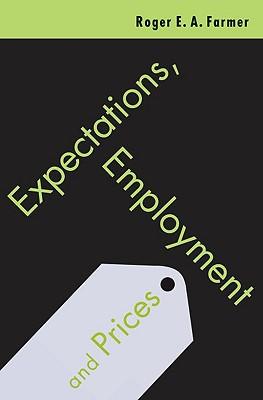Overview
Expectations, Employment and Prices brings Keynesian economics into the 21st century by providing a new paradigm that explains how high unemployment could potentially persist forever without a little help from the government. The book fills in logical gaps that were missing from Keynes' General Theory of Employment Interest and Money by reconciling some of its key ideas with modern economic theory. Central bankers throughout the world are talking now about developing a second instrument of monetary policy in addition to controlling the interest rate. This book directly addresses this issue and offers new creative monetary policy proposals and suggestions for the design of new financial institutions for the 21st century.
Full Product Details
Author: Roger Farmer (Professor of Economics, Professor of Economics, University of California, Los Angeles)
Publisher: Oxford University Press Inc
Imprint: Oxford University Press Inc
Dimensions:
Width: 23.60cm
, Height: 2.00cm
, Length: 15.70cm
Weight: 0.431kg
ISBN: 9780195397901
ISBN 10: 0195397908
Pages: 208
Publication Date: 29 April 2010
Audience:
College/higher education
,
Postgraduate, Research & Scholarly
Format: Hardback
Publisher's Status: Active
Availability: In Print

This item will be ordered in for you from one of our suppliers. Upon receipt, we will promptly dispatch it out to you. For in store availability, please contact us.
Reviews
<br> This is an ambitious book. We need to develop new approaches to business cycles and unemployment. Roger Farmer's attempt is refreshing, insightful and bold. --Daron Acemoglu, Charles P. Kindleberger Professor of Applied Economics, MIT and Co-Editor of Econometrica <br><p><br> This book is modestly represented by its author as an extension to Keynesian economics. But I am more inclined to represent it as a new tradition, 'Farmerian economics.' While both are intended to provide justification for active countercyclical policy in the face of market failure, the microfoundations for Farmerian economics are much stronger than those of John Maynard Keynes. Farmerian economics is as distinct from Keynesian and New Keynesian economics as Lucasian economics is from Classical and New Classical Economics. --William A. Barnett, Oswald Distinguished Professor of Macroeconomics, University of Kansas, and Editor, Macroeconomic Dynamics <br><p><br> In this important book, Roger Farmer challenges the commonly accepted structure of modern DSGE models. Since these models are still, at their core, neoclassical constructs they miss much of the intuition of Keynes' original contribution. Farmer builds microfounded dynamic equilibrium models that can generate persistent inefficient equilibria with high levels of unemployment. He confronts these models with data, and uses them to argue for vigorous government policies to avoid those situations. In this way, Farmer not only greatly enriches our understanding of dynamic macroeconomics, but shows how its tools can be applied to many different environments with a surprising level of flexibility and power. An insightful work that all macroeconomists interested in business cycles should read. --Jesus Fernandez-Villaverde, Associate Professor of Economics, University of Pennsylvania <br><p><br> What did Keynes really mean? How much of Keynesian intuition can be formulated using the language of modern macroeconomics? If you want to
<br> This is an ambitious book. We need to develop new approaches to business cycles and unemployment. Roger Farmer's attempt is refreshing, insightful and bold. --Daron Acemoglu, Charles P. Kindleberger Professor of Applied Economics, MIT and Co-Editor of Econometrica <br> <br> This book is modestly represented by its author as an extension to Keynesian economics. But I am more inclined to represent it as a new tradition, 'Farmerian economics.' While both are intended to provide justification for active countercyclical policy in the face of market failure, the microfoundations for Farmerian economics are much stronger than those of John Maynard Keynes. Farmerian economics is as distinct from Keynesian and New Keynesian economics as Lucasian economics is from Classical and New Classical Economics. --William A. Barnett, Oswald Distinguished Professor of Macroeconomics, University of Kansas, and Editor, Macroeconomic Dynamics <br> <br> In this important book, Roger Farmer challen
<br> This is an ambitious book. We need to develop new approaches to business cycles and unemployment. Roger Farmer's attempt is refreshing, insightful and bold. --Daron Acemoglu, Charles P. Kindleberger Professor of Applied Economics, MIT and Co-Editor of Econometrica <br><p><br> This book is modestly represented by its author as an extension to Keynesian economics. But I am more inclined to represent it as a new tradition, 'Farmerian economics.' While both are intended to provide justification for active countercyclical policy in the face of market failure, the microfoundations for Farmerian economics are much stronger than those of John Maynard Keynes. Farmerian economics is as distinct from Keynesian and New Keynesian economics as Lucasian economics is from Classical and New Classical Economics. --William A. Barnett, Oswald Distinguished Professor of Macroeconomics, University of Kansas, and Editor, Macroeconomic Dynamics <br><p><br> In this important book, Roger Farmer challenges the commonly accepted structure of modern DSGE models. Since these models are still, at their core, neoclassical constructs they miss much of the intuition of Keynes' original contribution. Farmer builds microfounded dynamic equilibrium models that can generate persistent inefficient equilibria with high levels of unemployment. He confronts these models with data, and uses them to argue for vigorous government policies to avoid those situations. In this way, Farmer not only greatly enriches our understanding of dynamic macroeconomics, but shows how its tools can be applied to many different environments with a surprising level of flexibility and power. An insightful work that all macroeconomists interested in business cycles should read. --Jesus Fernandez-Villaverde, Associate Professor of Economics, University of Pennsylvania <br><p><br> What did Keynes really mean? How much of Keynesian intuition can be formulated using the language of modern macroeconomics? If you want tor
Author Information
Roger E. A. Farmer is Professor and Department Chair at UCLA Department of Economics. He is a Research Associate of the National Bureau of Economic Research and the Centre for Economic Policy Research, and coeditor of the International Journal of Economic Theory. He is a member of the Financial Times Economists Forum, a specialist on macroeconomic theory and the author of five books and numerous scholarly articles.




